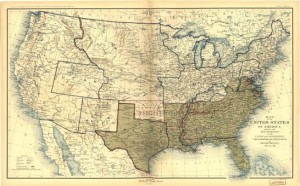 Today Liberty Baptist Church in Wilkinson County, Ga, gathers for a monthly business meeting. The third item on the agenda is a request from Richard L. Lavender “to take him under the watch care of the church until he returns from the war and wright (sic) to him on the subject.” Presumably church clerk Wiley Holland writes Lavender of the congregation’s affirmation, an acknowledgement likely of some comfort to the young soldier.
Today Liberty Baptist Church in Wilkinson County, Ga, gathers for a monthly business meeting. The third item on the agenda is a request from Richard L. Lavender “to take him under the watch care of the church until he returns from the war and wright (sic) to him on the subject.” Presumably church clerk Wiley Holland writes Lavender of the congregation’s affirmation, an acknowledgement likely of some comfort to the young soldier.
Born 20 January 1835 to Lemuel and Mary Lavender, Richard married 15-year-old Dalphy Martin in 1850 and didn’t sign up for the war until spring 1862 when, at age 27, he enlisted with Company A, Georgia 49th Infantry Regiment. Leaving behind a newborn – the first of ten children the couple would eventually have – Richard probably felt the need for spiritual protection when he asked for the church’s blessing as he faced what he knew by then was a long, lamentable war. Enlistees from the 49th bore the surnames of other members at Liberty, meaning Richard would join others of his congregational faith family in confronting the miserable, mournful months from which death ever lurked.
The 49th had marched into major battles in the eastern theatre from Hanover Courthouse on 27 May 1862 forward fighting under assignment to Gen. J. R. Anderson and E. L. Thomas in the Army of Northern Virginia. Their battle flags come to reflect famous combats such as at Seven Pines, Cedar Mountain, Second Bull Run, Harpers Ferry, Fredericksburg, Chancellorsville, Gettysburg, the Bristoe and Mine Run campaigns, the Wilderness, Spotsylvania Courthouse, and Cold Harbor before suffering the trenches at Petersburg south of the James River and wrapping up with stands at Fort Stedman and Appomattox. Through the harrowing years, Lavender witnessed high regimental casualties. Finally, on 9 April 1865 Richard Lavender surrenders along with 102 remaining 49th comrades. Afterward, he likely begins a homeward trek by foot with others headed to homes in Wilkinson County.
The remainder of his life is not unlike that of many other surviving soldiers in that he and his wife have children and he farms the best he can to provide a living for them all. In 1900 Richard applies for a pension as an indigent soldier, and on 22 January 1903 – two days after his 68th birthday – Richard Lavender’s life on earth comes to an end. Completing his earthly journey in the Baptist family of faith, he is buried at Ebenezer Baptist Church cemetery with a grave marker noting his service.
Source: Minutes, Liberty Baptist Church, Wilkinson County, Georgia
Note: Thanks to Arlette Copeland of Mercer University’s Jack Tarver Library Special Collections for this story.


